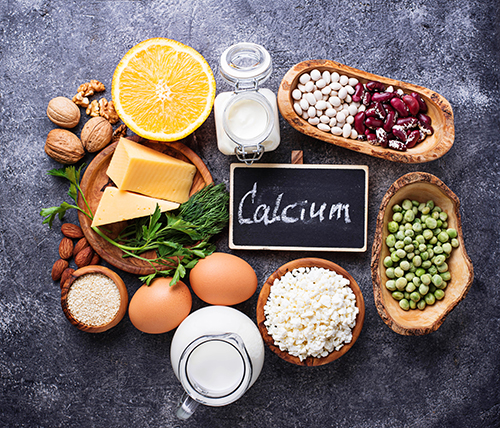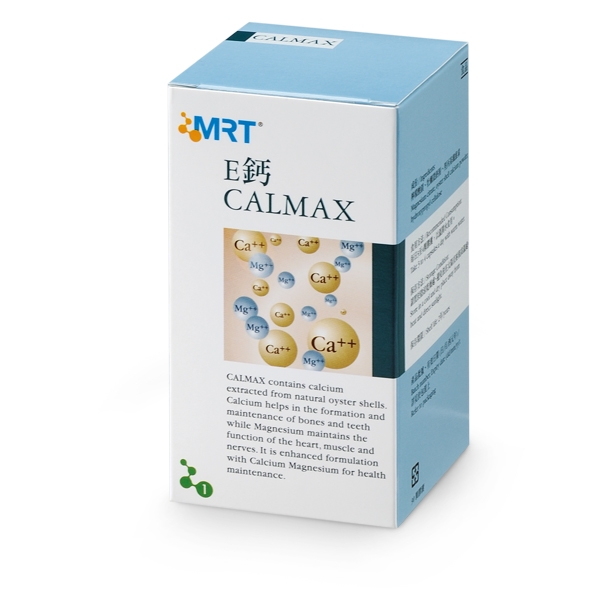Calcium is the most lacking mineral in the Taiwanese population
Calcium is the most abundant essential mineral in the human body, mainly stored in bones and teeth. As we all know, insufficient calcium can lead to osteoporosis which can easily lead to fractures. However, in addition to maintaining bone health, calcium is also important for cardiovascular health. It helps to maintain normal heartbeat and blood pressure, while also supporting blood coagulation and neuromuscular conduction. When calcium concentration in the blood is lower than the normal value, the bones will release calcium into the blood for use by the body. If the body is deficient in calcium for a long time but is not replenished in time, the calcium from the bones will be continuously extracted and the health of the bones will be naturally affected.
Are you in the high-risk group of calcium deficiency?
- Women after or during menopause: The decrease in oestrogen secretion leads to poor calcium absorption and accelerated bone loss. Therefore, a large amount of calcium must be added in time to alleviate the speed of bone loss.
- Vegetarians who do not eat dairy products: Dairy products are a rich source of calcium. If you do not eat such foods, it will easily lead to insufficient calcium intake.
- People with lactose intolerance: Their intestines are unable to secrete enough lactase to digest the lactose in milk; if they consumed foods with high lactase content, they will have symptoms of flatulence, abdominal pain or diarrhoea. It is recommended that they try other products that are low in lactose but high in calcium, such as yogurt, cheese, colostrum, or lactose-free milk.
- Sweets and coffee lovers: Sweets and caffeine stimulate the secretion of alkaline digestive juices in our bodies and reduce the absorption of calcium. As a result, those who love sweets and coffee drinkers will need more calcium supplements.
- Those with a craving for salty foods: An excessive intake of sodium will cause the excretion of urinary calcium, resulting in insufficient calcium in the body. In fact, sodium is not only found in table salt, many sauces, seasonings, and processed foods contain a lot of sodium. Therefore, more attention needs to be paid.
- Long-term drug users: Long-term use of aluminium-containing drugs or diuretics can affect calcium absorption.
- Those lacking in Vitamin D: Adequate sun exposure can make the skin synthesise vitamin D and help the body improve calcium absorption. The main natural source of vitamin D comes from sunlight. Therefore, you should pay more attention to your calcium intake if you don’t get enough exposure to the sun.
- Family history: Our genes determine 80% of our bone density. Studies have shown that if your mother’s bone density is low, there is twice the risk of her child suffering from osteoporosis.
- The elderly: With age, the efficiency of intestinal absorption of calcium will decrease. Thus, it is recommended that people over the age of 65 should increase their daily calcium intake.
What are high-calcium foods?
Did you know that the calcium content of the Japanese Urayaki eel is quite high? 100 grams of the Urayaki eel contains more than 200 mg of calcium, which is almost equal to the calcium content of a cup of fresh milk. Canned sardines, salmon and tempeh dace are also good choices. A can of canned fish with bones contains about 300 mg of calcium but pay attention to their salt content. The calcium content of sesame is also quite high. One tablespoon of it contains 89 mg of calcium. In addition to raw sesame seeds, you can also choose sesame paste but you should pay attention to their sugar content.


Calcium supplement health food
How to choose and take calcium supplementation health food?

Understand the calcium content and the absorption rate of the product
When buying calcium tablets, there are two important things to focus on – choosing a reputable brand and paying attention to the calcium content on the product label. Did you know that the total weight of calcium carbonate and the calcium content are two different things? For example, calcium carbonate is composed of carbonate and calcium elements, both of which contain about 40% of the calcium element. Therefore, for 500 mg calcium carbonate, the true calcium content is only about 200 mg (500 mg x 40% = 200 mg).
As it is, different types of calcium tablets have different absorption rates. For example, the absorption rate of calcium carbonate and calcium phosphate is generally 25-30% while the absorption rate of calcium citrate can be as high as 35%. But the calcium content of calcium citrate is only half that of calcium carbonate, about 21%.

Choose the type of calcium tablets that suit you
In addition to the common calcium tablets, calcium supplements on the market also have other dosage forms, including capsules, chewable tablets, calcium powder, calcium milk, etc. You can choose according to your personal needs and preferences. Calcium powder can be taken in a variety of ways. It can be immediately brewed and consumed or added to food. It is suitable for the elderly or those who cannot swallow medicine. At the same time, these two groups of people can also go for fast-dissolving or liquid calcium milk.

Do not take more than 500 mg of calcium at a time
Studies have shown that the optimum dosage of calcium by the human body is less than 500 mg at any one time. Since the gastrointestinal tract absorbs calcium slowly, it is useless to add too much at a time as it can easily lead to flatulence and constipation, and may even increase the risk of stones. Compared with taking 500 mg at a time, taking a 250 mg product in the morning and evening will have a better absorption effect. So, remember that when buying calcium tablets. Don’t pick the product with a dosage of more than 500 mg!

Eat moderately with meals
Calcium in most products is absorbed by the stomach acid. It is best to take it with a meal or within 2 hours after a meal. Because the acidic environment and vitamin C can improve calcium absorption, when taking calcium tablets, you can use orange juice or lemon juice. Remember to add enough water to prevent constipation when taking calcium supplements.
Why choose Elken Taiwan E-Calcium Calmax?
The formula also has the best ratio of calcium to magnesium, 2:1, which can help strengthen bone structure and maintain healthy teeth. Generally, the calcium supplementation health foods on the market contain very small amounts of natural calcium sources, most of which contain high amounts of synthetic products. Elken Taiwan’s E-Calcium Calmax is an ionised calcium supplement made from high-quality and selected oyster shells. It is not only natural but also free of toxins and heavy metals. It is suitable for people with lactose intolerance. Elken Taiwan’s E-Calcium Calmax ionised calcium supplement has been awarded the Best Bone Composition Award by Frost & Sullivan in the United States and its excellent quality is highly recognised.






